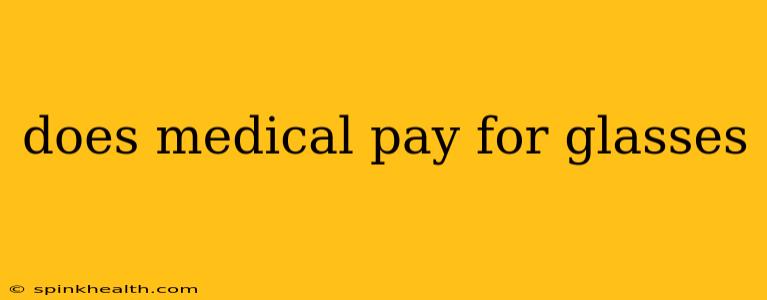Does Medical Insurance Pay for Glasses? The Eyeglass Enigma
The question of whether medical insurance covers eyeglasses is a common one, often met with a frustratingly vague answer: "It depends." Let's unravel this mystery, exploring the complexities of vision insurance, medical insurance, and the nuances of what each might cover. Imagine this: Sarah, a diligent office worker, squints at her computer screen, the small text blurring before her eyes. She needs glasses, but the cost is a worry. Will her insurance help?
This isn't a simple yes or no answer. The coverage depends on several crucial factors. It's less about whether glasses themselves are "medical" and more about why you need them.
What Does Medical Insurance Typically Cover Regarding Eye Care?
Medical insurance, like Medicare or Medicaid, primarily focuses on treating medical conditions impacting vision. This usually means:
-
Eye Exams for Medical Reasons: If you have a medical condition affecting your eyes, such as glaucoma, cataracts, diabetic retinopathy, or macular degeneration, your medical insurance might cover a comprehensive eye exam. This is because these conditions require medical intervention and monitoring. Think of it as a necessary checkup, crucial for managing your overall health.
-
Medically Necessary Procedures: If surgery or other medical treatments are needed to address a vision problem, like cataract removal or surgery for glaucoma, your medical insurance is more likely to cover these procedures and related expenses.
Does Medical Insurance Cover Routine Eye Exams and Glasses?
This is where things get trickier. Routine eye exams solely for refractive error correction (meaning needing glasses for nearsightedness, farsightedness, or astigmatism) are generally not covered by medical insurance. These exams are considered preventative, rather than medically necessary.
Similarly, the purchase of eyeglasses themselves is rarely covered by medical insurance. The rationale is that glasses are considered a corrective device, rather than a treatment for a medical condition. Think of it like needing braces – your dental insurance might cover the orthodontic treatment, but not necessarily the cost of the braces themselves.
What About Vision Insurance?
Vision insurance is separate from medical insurance. It often covers:
- Routine Eye Exams: These are specifically for refractive error correction.
- Eyeglass Frames and Lenses: This coverage typically involves a predetermined allowance, meaning you might receive a set amount to put towards frames and lenses, and any excess will be out of your pocket.
Vision insurance plans vary widely. Some offer comprehensive coverage, while others are quite limited. Always review your specific policy details.
What if I Have Both Medical and Vision Insurance?
Having both can be advantageous! If you have a medical condition impacting your vision, your medical insurance might cover the medically necessary eye exam and related treatments. Your vision insurance can then cover the routine eye exam and a portion of the cost of your eyeglasses.
How Much Do Eyeglasses Cost Without Insurance?
The cost of eyeglasses can vary significantly depending on the frames, lenses (single vision, progressive, etc.), and any additional features (anti-reflective coating, UV protection). Without insurance, you could be looking at a few hundred dollars at a minimum.
Can I Get Financial Assistance for Eyeglasses?
Several organizations offer financial assistance programs for those who cannot afford eyeglasses. These programs often target low-income individuals and families. Investigating these options might be worth your while if you are struggling with the cost.
In Sarah's case, if her vision problems are purely refractive, her medical insurance likely won't cover the glasses. However, her vision insurance could help offset the cost. Understanding the distinction between medical and vision insurance is key to navigating the world of eye care costs. Always check your specific policy details and explore all available options before making decisions about your eye care needs.

